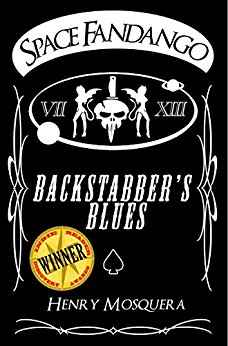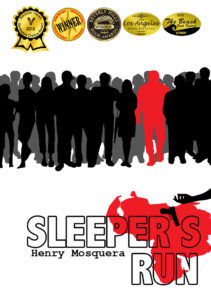Space Fandango: Backstabber’s Blues was the winner in the Science Fiction category of the 2017 IndieReader Discovery Awards, where undiscovered talent meets people with the power to make a difference.
Following find an interview with author Henry Mosquera.
What is the name of the book and when was it published?
Space Fandango: Backstabber’s Blues. It was published on February 13th, 2017.
What’s the book’s first line?
It was a ghost ship.
What’s the book about? Give us the “pitch”.
A mysterious ship with a deadly cargo crashes on a backwater planet. A deal is made to get rid of the payload, which needs to be transported through a dangerous, independent section of space. To do this, a crew is assembled among a group of criminals in hiding, each with a unique background and a particular set of skills. Throughout the perilous journey, the crew will have to face numerous challenges including their own pasts.
What inspired you to write the book? A particular person? An event?
The book was inspired by everything that influenced me growing up: movies, anime, video games, comic books, novels, and role-playing games. All of these elements were blended together and passed through the filter of my imagination.
What’s the main reason someone should really read this book?
FUN. This is the perfect book to take on a long flight, or if you’re trapped in an elevator.
What’s the most distinctive thing about the main character? Who-real or fictional-would you say the character reminds you of?
Wow! How much time do you have? The book has seven main characters, each with a unique personality, skillset, alien race, and background. I’ll try to distill them into one word. Let’s see: the pilot, humor; the co-pilot, leadership; the mechanic, deadly; the chef, principled; the systems operator, wit; the doctor, class; the thief, shrewdness. Why am I not using their names? You’ll have to read the book to understand.
Who do they remind me of? Real, nobody. Fictional, they would be an amalgam of different fictional characters.
If they made your book into a movie, who would you like to see play the main character(s)?
The story is too long to be made into a movie that would do it justice, so I say, Netflix baby! Preferably an anime series. Each chapter can be easily made into an episode. As for the voice cast—ideally? I’ll take a stab at it off the top of my head: the pilot, Oscar Isaac; the co-pilot, Charlize Theron; the mechanic, Clancy Brown; the chef, Jason Momoa; the systems operator, Gina Gershon; the doctor, Ian McKellen; the thief, Scarlett Johansson. There, how’s that? We can all live in hope, right?
When did you first decide to become an author?
I’ve been writing for a very long time. I started out doing film and comic book scripts in ’98. I penned my first novel in 1999, but it was terrible, so I never attempted to publish it. But it did show me that I had the passion and discipline to be a novelist. In 2009, I decided to take another stab at writing a book. I had a lot of fun and the book was a critical smash, so I kept on going.
Is this the first you’ve written?
No. This is my third published novel. The first one is a political thriller entitled, Sleeper’s Run, which I’m proud to say won the 2012 IndieReader Discovery Award in the Mystery/Thriller category, among others. And my second book—also a multiple award winner—was a literary fiction novel called, Status Quo, which Kirkus Reviews named one of the best books of 2014.
What do you do for work when you’re not writing?
I’m a graphic designer, a profession that has come in pretty handy as an indie author. I’ve designed all the covers of my books for example.
How much time do you generally spend on your writing?
You know those writing classes/books/seminars that tell people to make a habit of setting aside an hour to write every day? Well, I’m the exact opposite. I need to set time aside to stop writing. Once I type “Chapter One,” it’s on. From research (if appropriate), to first draft, to re-writes, edits, you name it. I really love the journey.
What’s the best and the hardest part of being an indie?
The best thing is that you do what you want they way you want it. You don’t have to write for a specific demographic, follow trends, stick to a genre, fit a publisher’s profile, or what have you. You can be as creative and experimental as you want to.



